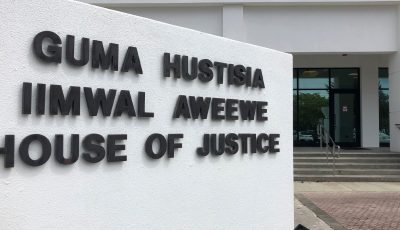Habeas corpus request of man who jumped from DOC balcony is denied
Superior Court Associate Judge David A. Wiseman denied yesterday an application for writ of habeas corpus filed by Xu Guang Li, a Chinese national who was slapped with a five-year prison term for possession of less than two grams of methamphetamine or “ice” and claimed that he failed to appear in court because Department of Corrections personnel refused his requests to use a telephone to talk to his lawyer.
A writ of habeas corpus is an extraordinary legal remedy and its purpose is to release prisoners who are illegally restrained of their liberty.
An additional purpose is to allow the prisoner to challenge the factor duration of his confinement, and allow the prisoner to seek immediate or speedier release.
Wiseman ruled that Li’s application for writ of habeas corpus was not a collateral attack on defendant’s sentence, and that his claim should have been brought to the CNMI Supreme Court under direct appeal.
Wiseman ordered assistant public defender Matthew Meyer, counsel for Li, to advise the defendant in the matter of obtaining new post-conviction counsel for the purpose of filing a successive application for writ of habeas corpus limited to the issue of ineffective assistance of counsel.
Li, 36, was convicted on a charge of illegal possession of a controlled substance during a bench trial on Sept. 5, 2013.
On Sept. 18, 2013, Superior Court Associate Judge Joseph N. Camacho sentenced Li to five years in prison. Camacho denied a presentence investigation report because “the case is relatively straightforward.”
At the sentencing hearing, Li indicated to his counsel, Meyer, that he did not wish to file an appeal.
Five days after the sentencing, Li reportedly jumped from a second floor balcony at the Department of Corrections, fracturing his spinal vertebrae. He spent time at the Commonwealth Health Center from Sept. 22 to Oct. 24, 2013.
On Oct. 15, 2014, after Li’s right to appeal had passed, he, through Meyer, filed the application for a writ of habeas corpus requesting post-conviction relief in the form of the right to file a belated appeal.
Meyer asked the court that Li be immediately released from incarceration and for the trial court to conduct a new sentencing hearing.
To support Li’s claim for post-conviction relief, Meyer alleged that Department of Corrections personnel prevented Li from using the telephone.
Meyer claimed that Li’s attempts to call an attorney and ask for the attorney to file an appeal were rebuffed by DOC personnel.
Meyer asserted that Li missed the filing deadline to file an appeal because of the actions of DOC personnel.
Li sought immediate release from DOC, and requested that the trial court conduct a new sentencing hearing “consistent with Commonwealth law.”
Meyer argued that the court should issue habeas corpus relief because the sentencing court violated Li’s constitutional due process rights.
In denying the petition, Wiseman said the attorney who is subject of the claim of ineffective assistance of counsel should not prosecute the claim.
Wiseman said he does not find it proper that a defendant’s attorney at trial can bring a post-conviction claim arguing that he or she provided ineffective assistance.
Wiseman said he takes judicial notice of the fact that Li’s current counsel (Meyer) is the attorney who is the subject of the ineffective assistance of counsel claim.
“This is problematic for a number of reasons,” Wiseman pointed out.
First, Wiseman said, it makes the court skeptical of Li’s claims.
Second, he said, such representation creates a substantial potential for a conflict of interest.
Wiseman said he is persuaded that the potential dangers of a conflict of interest where trial counsel serves as appellate counsel are also apparent when trial counsel seeks post-conviction habeas corpus relief under a Sixth Amendment claim for ineffective assistance of counsel.
Accordingly, Wiseman said, he declines to address this issue.



























